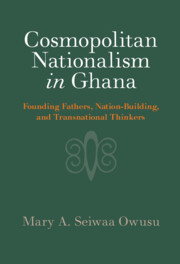Book contents
- Cosmopolitan Nationalism in Ghana
- Cosmopolitan Nationalism in Ghana
- Copyright page
- Dedication
- Contents
- Figures
- Tables
- Acknowledgements
- Abbreviations
- Maps
- Introduction
- 1 Ghana’s Grand Narrative
- 2 Rethinking Proto-Nationalism
- 3 Rethinking Cultural Nationalism as Debates on Synthesis (1887–1920)
- 4 Misreading Conservative Nationalism (1920–1945)
- 5 Rethinking the Monopoly of Radical Nationalism (1946–1958)
- Conclusion
- Bibliography
- Index
2 - Rethinking Proto-Nationalism
Blyden and Horton (1863–1912)
Published online by Cambridge University Press: 12 December 2024
- Cosmopolitan Nationalism in Ghana
- Cosmopolitan Nationalism in Ghana
- Copyright page
- Dedication
- Contents
- Figures
- Tables
- Acknowledgements
- Abbreviations
- Maps
- Introduction
- 1 Ghana’s Grand Narrative
- 2 Rethinking Proto-Nationalism
- 3 Rethinking Cultural Nationalism as Debates on Synthesis (1887–1920)
- 4 Misreading Conservative Nationalism (1920–1945)
- 5 Rethinking the Monopoly of Radical Nationalism (1946–1958)
- Conclusion
- Bibliography
- Index
Summary
This chapter examines key writings of James Africanus Beale Horton and Edward Wilmot Blyden to highlight the inconsistencies inherent in the labelling of these activist writer-intellectuals as “proto nationalists.” Horton was a British army medical officer who was a participant in British conquests. Yet, he is indispensable to nationalist history because of extant evidence in letters, pamphlets and books that establish his commitment to self-government for West Africa as well as its progress. Blyden occupies the position of foremost articulator of the “African personality.” Yet, Blyden campaigned for Britain to colonise Liberia. Treating them as hostile to the ideals of later anti-colonial nationalists falls down because they shared with this later group a faith in and hope for African independent fluorescence. These conundrums are resolved by understanding them as, first, dealing with problems of the day in the terms of the day and second, being pro-African and not necessarily anti-colonial.
- Type
- Chapter
- Information
- Cosmopolitan Nationalism in GhanaFounding Fathers, Nation-Building, and Transnational Thinkers, pp. 53 - 99Publisher: Cambridge University PressPrint publication year: 2024

